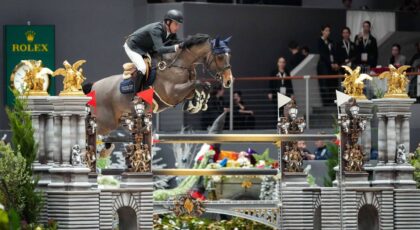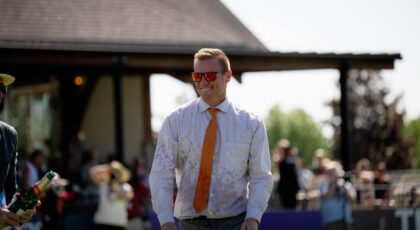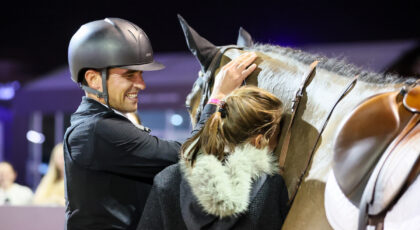She’s off the trunk before I come around the corner, a flurry of scraping nails and excited whimpers.
Maybe it was the familiar cadence of the horse’s hooves on pavement. Maybe she caught a scent on the breeze. Up until this moment, she’s been motionless.
Immune to the sweeping of brooms or the tacking up of horses, the summons of barn children wishing to scratch and console her. Loosely tied to her tack trunk, alert yet composed, her watch has begun. She flicks an ear, adjusts a chin across her paws. She waits.
It may be few minutes, it may be a couple of hours. She won’t complain.
She’s a barn dog, the best kind you’ll find. Her head is always cocked for the sounds of danger.
She knows the scraping of panicked hooves on pavement, the tenor of angry squeals, the warning honk-snort of an animal in fear. Inattention is a risky game in this place, surrounded by stomping, fearful creatures whose feet thunder the ground, so tall they blot out the sun.
“Her” horse is less flighty, more predictable. She trusts none of them, not even him, but she’s learned to recognize the velvety, dust-and-sweet-hay smell of him.
She knows, too, what he brings with him. Knows how to make out his willowy bay outline from a distance.
She can recognize the clop of his feet as he wends his way up the horse show road or down the barn aisleway. He is accustomed and calm in her presence, even on those rare occasions when she forgets herself; dashing around his feet after a ball or frisbee.
But she is not here for him.
Her eyes are only for the smaller figure on his back, growing steadily larger with each step. The cautious wag of her tail becomes a steady metronome, then a full-body waggle. She bounds from the tack trunk, certain now. Her eyes track the figure with a wild, preternatural intensity: hope.
She knows the stakes. Sometimes the round went well, the rails stayed in the cups, the plan went off without a hitch. On other, rare occasions, something else has occurred. She takes in slumped shoulders, averted eyes, the absent minded scratching of the neck and withers. Once or twice, she’s detected a smear of arena dirt on the snow white breeches.
Her greeting will be the same.
And, as I slide to the ground, she’s in my arms. One hand holds the reins, our horse tolerant, as she leaps and whines and bounds at his feet. To her, it doesn’t matter what the day has wrought, or what the class might look like tomorrow. For her, there is only her and me and us and now—right now.
She’s a barn dog, the best kind you’ll find. Her needs are minimal, her conscience pure. Her job, her calling, is joy.




 November 19, 2024
November 19, 2024 




























